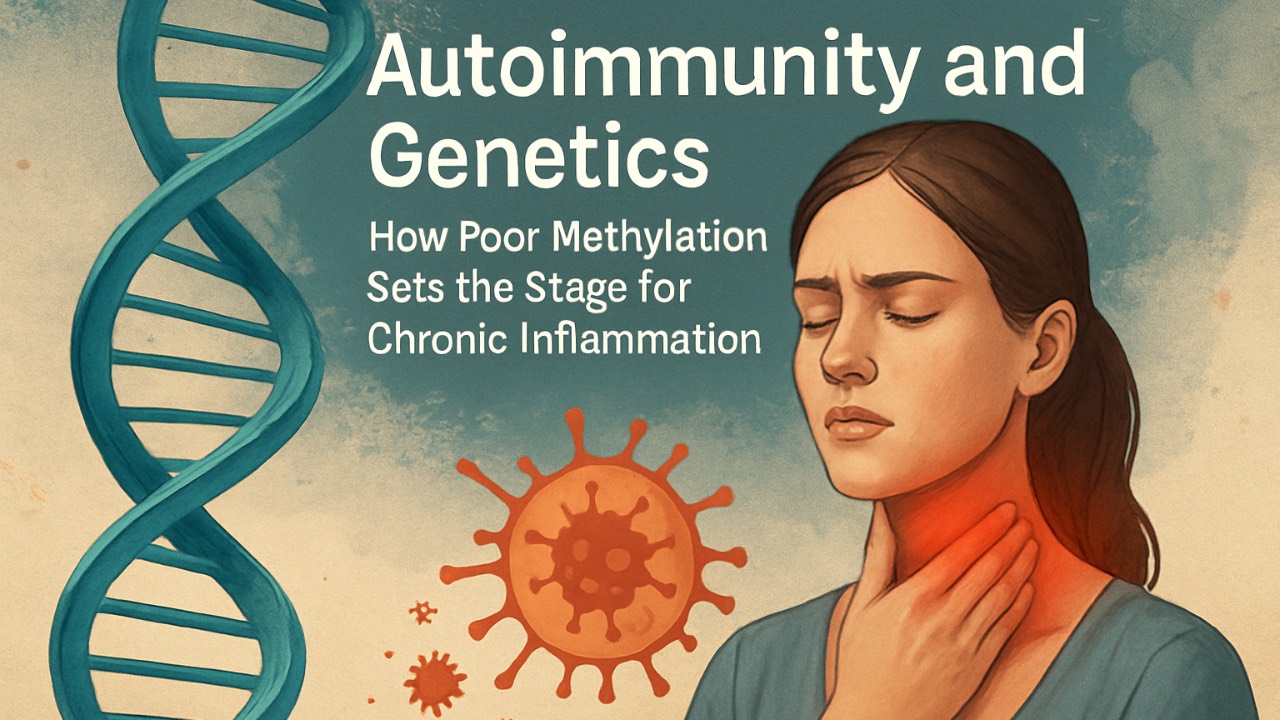Autoimmunity and Genetics: How Poor Methylation Sets the Stage for Chronic Inflammation
Apr 28, 2025
It usually does not happen all at once.
You start feeling a little off. Maybe it is harder to recover from colds. Maybe you get weird skin rashes you never had before. Maybe you are just tired more often than not, even when you are technically doing everything right.
And somewhere in the background, your immune system is shifting.
Not loudly. Not enough to show up on a standard lab panel.
Just… enough.
Enough to start building momentum in the wrong direction.
Long before autoimmune disease gets diagnosed, your body often gives you little signs. Signals that something, somewhere, is struggling to stay balanced.
And one of the quietest, most overlooked contributors?
Your methylation pathways.
Methylation: The Unseen Foundation
It is strange how rarely we talk about methylation, considering how central it is.
This process — this simple adding of a “methyl group” to different molecules — affects almost everything. DNA repair. Detoxification. Neurotransmitter production. Immune regulation.
And when methylation starts to slip, even a little, it is like pulling a thread out of a sweater.
At first, you might barely notice.
But given enough time, the fabric can start unraveling in places you never expected.
Genes like MTHFR, MTR, and BHMT sit right at the heart of this process.
When they are working smoothly, your body maintains a delicate kind of flexibility. It adapts, repairs, and stays grounded even under stress.
But when these genes are underpowered — due to variations, nutrient depletion, or just too much life piling up — the cracks start forming.
How Poor Methylation Stirs Up Inflammation
At first, poor methylation shows up in subtle ways.
You might notice more food sensitivities. Maybe a creeping intolerance to stress.
A slow loss of resilience you cannot quite explain.
Underneath it, inflammation starts simmering.
One reason for this is that methylation helps control something called the NF-kB pathway — basically one of the body’s major “on-switches” for inflammation.
When methylation lags, that switch gets stuck halfway on. Not enough to create a full-blown emergency, but enough to keep your system in a constant, low-grade alert mode.
And over time, that wears you down.
It wears down the gut lining. It wears down the blood-brain barrier.
It wears down the quiet, intricate tolerance your immune system usually has toward your own tissues.
Eventually… mistakes start happening.
The body starts tagging its own tissues as threats. It is not sudden. It is not dramatic at first.
It is more like a slow accumulation of little misfires.
And that is where autoimmunity often begins.
The Role of MTHFR, MTR, and BHMT in Quiet Immune Chaos
If you have variations in MTHFR — especially ones like C677T or A1298C — your ability to recycle folate efficiently is compromised.
This leads to a bottleneck in methylation. Not enough methyl groups to go around for all the systems that need them.
MTR and BHMT work closely with MTHFR. They help recycle homocysteine back into methionine, another key piece of the methylation puzzle.
When these genes falter, homocysteine can build up, and the system that normally keeps inflammation in check starts running unevenly.
It is a little like trying to run a city on a faulty power grid.
Lights flicker. Traffic signals misfire.
Small problems cascade into bigger ones.
And you feel it.
Maybe not all at once. But you feel it.
In the aching joints that come and go.
In the food sensitivities that seem to multiply.
In the foggy days that feel harder to shake off.
Why Spotting It Early Matters
Here is the thing.
Methylation issues are not destiny. They are vulnerabilities.
And the earlier you see them, the easier it is to shift course.
Supporting methylation is not about blasting your body with every B vitamin you can find.
(It is honestly a little more nuanced than that.)
It is about knowing where your weak points are.
Where the system might need a little extra care.
Where the inflammation is starting to creep in, quietly, before it takes root.
And that knowledge — that glimpse into how your body is wired — gives you real options.
Not perfect solutions. Not guarantees.
But choices you did not even know you had before.
If You Are Wondering Where to Start
If any of this feels familiar — if you have been living with unexplained symptoms and feeling like the pieces do not quite fit together — it might be time to look at your methylation blueprint.
Genetic testing, like the Works Panel from MaxGen Labs, can help map out where your methylation pathways are running smooth, and where they might be struggling a bit.
And if you already have results but feel like you are staring at a foreign language… that is pretty normal too.
I have helped hundreds of people walk through their reports, slowly, piece by piece, connecting the dots in ways that actually fit their real life.
It is not about diagnosing. It is not about labeling.
It is about seeing what was always there — just under the surface — so you can move forward with a little more clarity.
If that feels like something you are ready for, you can learn more about setting up a consultation here.
Because sometimes, understanding the why behind your symptoms… makes all the difference in what you choose to do next.


